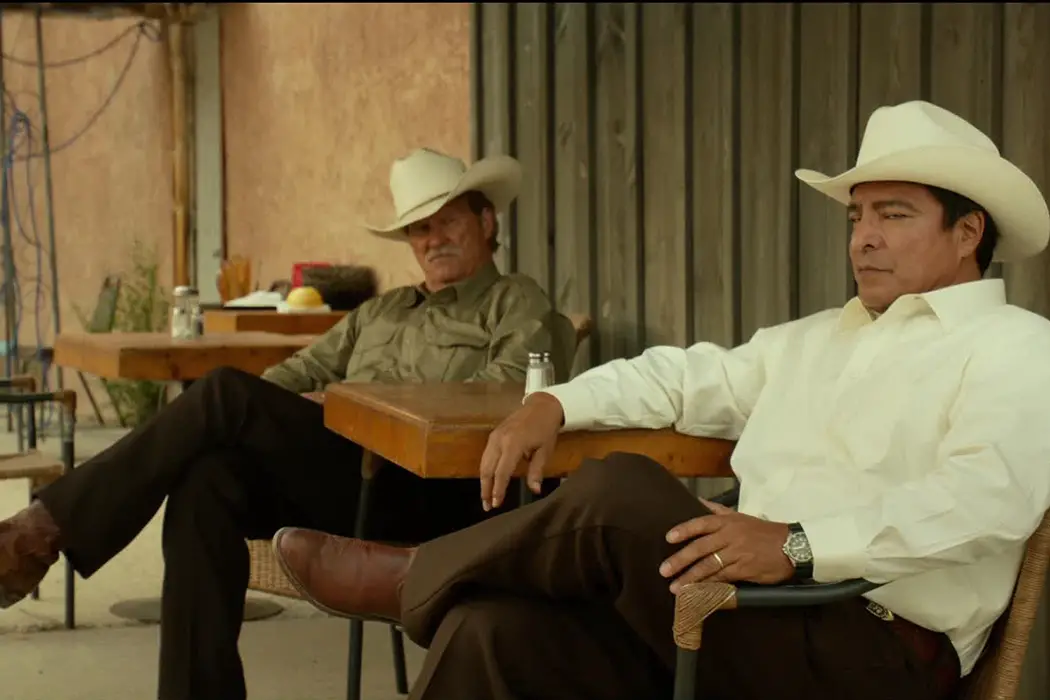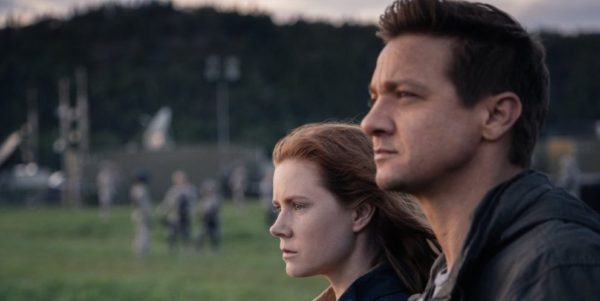ARRIVAL & HELL OR HIGH WATER Are Smart, But They Don’t Trust Us To Be

“You want to make a baby?”
That is some real actual dialogue that is spoken completely unironically by a main character in Arrival. Don’t be fooled; the rest of the movie is genuinely compelling and emotionally impactful. 90 minutes of subtle symbolism and tight storytelling plus five to ten minutes of cheesy dialogue and heavy-handedness is far too common a formula for “smart” movies these days – and Arrival and Hell or High Water follow this template to a T.
Hell or High Water robs us of drawing meaning from the story
Hell or High Water does a fantastic job of keeping us captivated without letting us in on what exactly is going on. Just enough subtle plot hints are dropped here or there so that we can follow the action while trying to figure out the characters’ motivations at the same time. We first infer that Toby (Chris Pine) has recruited Tanner (Ben Foster) to rob banks; then we find out that they’re trying to raise a certain amount for some reason; then we find out that they’re going to pay it back to the same bank they’re robbing; then finally, over halfway through the movie, it is revealed that they had previously found oil on their ranch.

That’s when it all clicks. It takes us a few seconds to work it out, but we realize that they have been robbing banks in order to pay back that same bank for the mortgage on the ranch, so that they can eventually profit from the oil they found. It’s a compelling story made even more intriguing by the fact that we have to figure it out for ourselves along the way.
The plot executes this to perfection – so it’s disappointing and jarring when the symbolism of the movie is shoved in our faces. Director David Mackenzie took “show don’t tell” a bit too literally when he decided to insert a “Debt Relief” or “Closing Down” sign in each and every driving scene (and there were several). But that alone would be mostly forgivable; it’s the heavy-handed, clumsy dialogue by Alberto (Gil Birmingham) that really sticks out like a sore thumb.
While he and Marcus (Jeff Bridges) are sitting outside a bank waiting for it to get robbed, Alberto decides that now is the time for ham-fisted exposition: “150 years ago, this was my ancestor’s land… ‘Til the grandparents of these folks took it, and now it’s been taken from them. Except it ain’t no army doin’ it, it’s those sons of bitches right there.” He raises a finger to point – to absolutely no one’s surprise – to the bank they are guarding.

Before this point in the story, Alberto was a supporting character whose ethnicity might have gently pushed us to consider some interesting analogies and parallels. Now, he’s just a mouthpiece placed there to explicitly draw the comparison between what banks did to the middle class and what white people did to the Native Americans (the massacre and displacement of Native Americans might be a wee bit worse than predatory loaning – but a thought-provoking comparison nonetheless).
Given that the movie did not hold our hands to help us figure out the plot, we should have been trusted to understand the symbolism on our own. The story is literally two people robbing banks to retaliate for what those same banks did to their mother – it’s not such an unlikely leap to realize that the banks robbed us first.
Arrival abducts our ability to think for ourselves
Disappointingly (maybe not as disappointing as these puns in my headers, but still), Arrival pulls the exact same trick. The movie lets us learn about the aliens and their language right alongside of Louise (Amy Adams) and Ian (Jeremy Renner). We never know more than our main characters do, and they never know more than we do (it’s especially difficult to create tension when this is the case, but Arrival pulls it off perfectly). We’re led to believe that all of the dreamlike sequences with Louise and her daughter are flashbacks, until it drops the bomb on us – they’re actually flash-forwards, and Louise chose to have her daughter despite knowing all of the sadness (and happiness) that would come with it.

At this point, we’re left asking ourselves some really hard-hitting questions about our personal experiences, whether we would want to know beforehand about all the sadness in our lives, whether we would change those experiences…
And then they swoop in and take that from us with some misguided, heavy-handed dialogue. “Despite knowing the journey and where it leads, I embrace it. And I welcome every moment of it.” “If you could see your whole life from start to finish, would you change things?” “I’ve had my head tilted up to the stars for as long as I can remember, and you know what surprised me the most? It wasn’t meeting them…” Oh no please don’t say it. “It was meeting you.”
The cheesiness of the last five minutes completely betrays the tone of the rest of the story. It’s smart and tightly wound until it unravels with some cliché dialogue straight out of a Hallmark movie.
Conclusion
This trend is especially disappointing in both of these movies because they both craft some great allegorical stories that make us think about these issues already. They didn’t need to come out and tell us what to think, but they felt the need to nonetheless.
Having the symbolism explicitly outlined by a main character also limits what the movie can really communicate to us. Without this on-the-nose dialogue, our imaginations can run wild about what certain elements of the story mean to us personally. But instead, we’re told that this is what the director wants you to feel – and allegorical storytelling is so much more impactful and satisfying when we’re left to figure that out on our own.
Did the cheesiness in Arrival or Hell or High Water stick out to you? Would you have still gone to see Arrival if you knew it was going to be sad beforehand? Is everyone completely ignoring the fact that Jeremy Renner’s character had no say in whether he wanted to father a terminally ill child? Let us know in the comments!
Does content like this matter to you?
Become a Member and support film journalism. Unlock access to all of Film Inquiry`s great articles. Join a community of like-minded readers who are passionate about cinema - get access to our private members Network, give back to independent filmmakers, and more.












